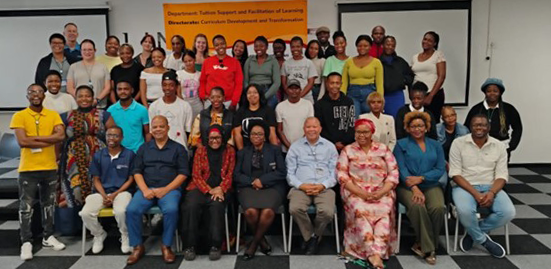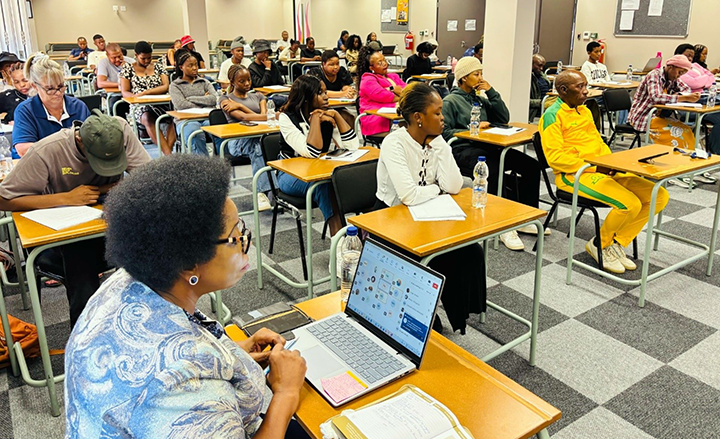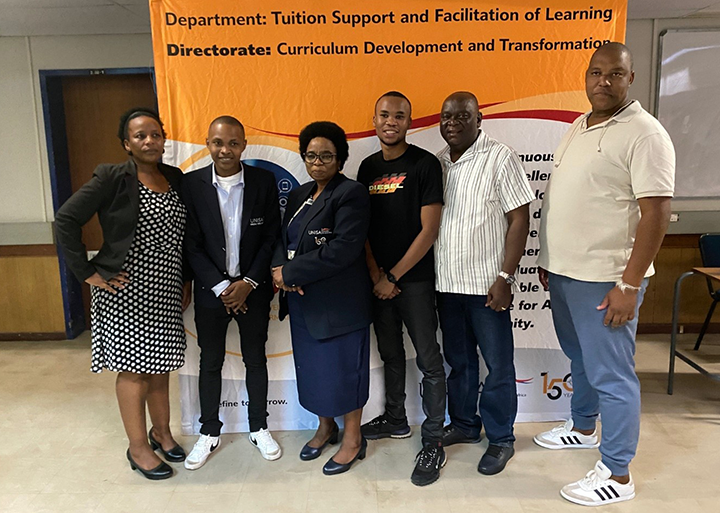News & Events
Unisa is committed to transforming student lives through real-time query resolution and support
The Department of Tuition Support and Facilitation of Learning (DTSFL), under the leadership of its Executive Director, Professor Meahabo Magano, reaffirms its unwavering commitment to the student support agenda, prioritising academic success for all Unisa students.

Prof Meahabo Magano, Executive Director: DTFSL (seated, fourth from left), led the team in their mission to support Unisa students in correctional and regional centres
Effectiveness: Student support at correctional and regional centres
Following the recent correctional and regional visits, the DTSFL team consisting of Dr Devan Govender, Graeme Wilson, Dr Denzil Chetty, Dr Rakwena Reginald Mpho Monareng, Dr Phumza Makgato-Khunou, Dr Jabulane Nene, Lekau Rachidi, Michelle Luckay, Dr Pinagase Tshephe, Reuben Legodi, Gladwell Marebane and Dr Mutambuli Hadji, and led by Magano, continued its mandate to provide quality services and support in an ethical manner, to mitigate institutional barriers to student learning and success, to provide and coordinate academic development interventions, and contribute towards a positive student experience and student support for Unisa students. The sessions were conducted both virtually and in person at correctional and regional centres across the country.

The DTFSL team with Unisa students during a regional visit
Magano emphasised the crucial role of collaboration between both academic and support departments in mitigating institutional barriers to student learning and success. This collaboration enhances the student learning experience and ensures the successful completion of qualifications at Unisa. During the correctional and regional centre visits from 10 to 27 March 2025, the DTSFL ensured that there was representation in every region by splitting the team across the Gauteng, North-Eastern, Midlands, KwaZulu-Natal, Eastern Cape and Western Cape regions. The sessions provided a platform for academic and support departments to engage with students in real-time, with correctional centres including Kgosi Mampuru, Johannesburg, Mangaung, Tswelopele, Kutama Sinthumule, Barberton, Durban Westville, St Albans, Brandvlei and Mtata participating virtually.
Although the DTFSL held pre- and post-registration orientations, including claiming myLife accounts and online MOOCs for first-year students, many first-year students in the regions still seemed uncertain. These correctional and regional visits provided a platform for students to receive real-time support.
During these engagements, the DTSFL addressed critical student concerns including funding and bursaries. Students received real-time support with postgraduate bursary funding and allowance-related queries. The DTSFL also held workshops to assist students in accessing their myUnisa accounts, including myLife email addresses and myModules.
Many first-year students did not know how to access learning materials, but by the end of the sessions, they were able to do so. Magano urged students to complete and submit their assignments on time to secure NFSAS funding, communicate with their module lecturers, engage with student representatives, attend online classes and visit regional centres regularly to access the available student support resources.
Key challenges addressed at correctional and regional centres
The DTSFL made significant strides in addressing unique challenges faced by Unisa students through virtual engagements in correctional centres. These initiatives reflect the university’s commitment to ensuring equitable access to education and fostering a supportive learning environment for all Unisa students. In collaboration with academic and support departments, the DTSFL provided platforms for students to raise concerns about academic challenges, proctoring restrictions, financial support, access to printed learning materials and practical experience required for certain qualifications.
Key challenges addressed include:
- Proctoring restrictions: Unisa students at correctional centres expressed difficulties in complying with the Unisa proctoring tools during assessment due to facility restrictions. The myUnisa team and the Department of Correctional Services will secure exemptions for these students to ensure fair assessment conditions.
- Learning materials: students requested printed learning materials due to limited internet access. The DTSFL will ensure students in correctional centres have access to printed learning materials.
- Practical exposure: Students enrolled in qualifications requiring practicals have requested that the location of practical sessions be included in the programme, especially for students outside of Gauteng. Additionally, students at correctional centres have requested either an exemption from this requirement or the opportunity to complete their practicals within the facilities.
- Data provision: most students requested that the university review the current data allocations to ensure that they have sufficient access for their academic needs including online lessons.
- Academic integrity course support: students received real-time support to access and complete the course successfully.
Recognition of linguistic diversity and inclusion
One of the highlights of the correctional and regional visits was the DTSFL’s recognition of linguistic diversity. Students were encouraged to engage in their preferred languages where possible. This reflects Unisa’s commitment to inclusivity and cultural preservation. First-year students were also encouraged to engage with module-specific glossaries in their learning materials, as well as the first-year experience at Unisa to access information in all 11 official South African languages. Magano further urged students living with disabilities to disclose their status to get relevant support from the Advocacy and Resource Centre for Students with Disabilities (ARCSWiD).

The DTSFL team with national and regional student representatives during a regional visit
Commitment to continued support
The collaboration between academic and support departments and the Department of Correctional Services has proven to be highly effective in enhancing student support. The DTSFL would like to thank the Department of Correctional Services for their educational programmes aimed at transforming lives through education. Additionally, the DTSFL appreciates the dedication of Unisa academic and support departments for availing themselves to address student queries and providing real-time assistance.
Way forward
The DTSFL will continue its mandate to mitigate teaching and learning barriers, contribute to improved pass rates and minimise dropout rates. The challenges faced by Unisa students in rural areas, including the digital divide and financial constraints, require immediate action. The DTSFL aims to mitigate these risks and ensure student retention by establishing strategic partnerships with local schools and municipalities to create accessible hubs where Unisa students can gain basic digital skills and academic support.
By addressing learning and teaching barriers and providing continuous student support. Unisa is transforming lives.
* By Lillian Maja, Language Practitioner, Directorate Language Services
Publish date: 2025-04-10 00:00:00.0

